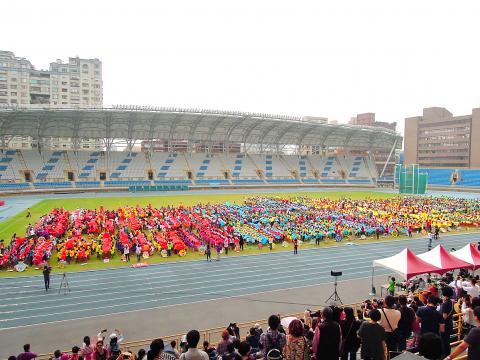The 2017 Universiade’s opening and closing ceremonies will not be held at the Taipei Dome — as originally planned — but will instead be moved to the Taipei Municipal Stadium, Taipei Mayor Ko Wen-je (柯文哲) said yesterday.
“If you take into account the time needed to prepare the interior, it cannot be guaranteed that the Taipei Dome project will be completed on time,” Ko said, adding that it would be easier to conduct city business if the Taipei Dome and the Universiade were “disconnected.”
The ceremonies were originally scheduled to be held in the Taipei Dome, but construction has fallen behind schedule amid conflict between the city government and contractor Farglory Group (遠雄集團) over safety and contract terms.

Photo: Liang Pei-chi, Taipei Times
Ko said the stadium had already been used for the 2009 Summer Deaflympics, adding that its smaller seating capacity was the only drawback.
The stadium can seat 20,000 people, half of the Taipei Dome’s seating capacity as specified in construction plans.
While the city would consider measures to increase the number of seats, it estimated that lost ticket sales from holding the ceremonies at the stadium would total NT$200 million (US$6.5 million), Ko said.
He added that the city’s backup plan called for the ceremonies to be moved to the Taipei Arena. Unlike the Taipei Dome, the Taipei Municipal Stadium cannot be covered to shield spectators from the elements.
The city’s decision came as the first round of arbitration talks between the Taipei City Government and Farglory fell apart at the last minute yesterday.
Shortly before the arbitration proceedings at the Taiwan Construction Arbitration Association were to begin, arbitration committee chair Yao Nai-jia (姚乃嘉) announced that Shih Yi-fang (施義芳), Farglory’s arbitration representative, had just called to announce her resignation, without specifying a reason.
Taipei Department of Legal Affairs division chief Shen Hsing-lin (沈杏霖) said the city government was “astonished” and “at a loss” over Shih’s resignation, while emphasizing the city government’s position that there are currently no grounds for arbitration.
She said the Taipei Dome contract calls for a negotiation committee of representatives appointed by the firm and city to be established if talks break down. Arbitration is only required if the “harmonization committee” is unable to resolve the dispute after three months, she said.
She said the city agreed to send a representative yesterday, because only the arbitration committee could deny Farglory’s demand for arbitration.
Farglory spokesman Jacky Yang (楊舜欽) said Shih had not contacted the firm to explain her resignation.
He added that Farglory had demanded arbitration in April only after the city failed to respond to a March request to establish a “harmonization committee.”
Under the city’s contract with Farglory, if either party is unsatisfied with the result of arbitration, they can take the dispute to court.
The Universiade is an international biannual college student competition billed as second only to the Olympics by its organizer, the International University Sports Federation.

CHAOS: Iranians took to the streets playing celebratory music after reports of Khamenei’s death on Saturday, while mourners also gathered in Tehran yesterday Iranian Supreme Leader Ayatollah Ali Khamenei was killed in a major attack on Iran launched by Israel and the US, throwing the future of the Islamic republic into doubt and raising the risk of regional instability. Iranian state television and the state-run IRNA news agency announced the 86-year-old’s death early yesterday. US President Donald Trump said it gave Iranians their “greatest chance” to “take back” their country. The announcements came after a joint US and Israeli aerial bombardment that targeted Iranian military and governmental sites. Trump said the “heavy and pinpoint bombing” would continue through the week or as long

TRUST: The KMT said it respected the US’ timing and considerations, and hoped it would continue to honor its commitments to helping Taiwan bolster its defenses and deterrence US President Donald Trump is delaying a multibillion-dollar arms sale to Taiwan to ensure his visit to Beijing is successful, a New York Times report said. The weapons sales package has stalled in the US Department of State, the report said, citing US officials it did not identify. The White House has told agencies not to push forward ahead of Trump’s meeting with Chinese President Xi Jinping (習近平), it said. The two last month held a phone call to discuss trade and geopolitical flashpoints ahead of the summit. Xi raised the Taiwan issue and urged the US to handle arms sales to

BIG SPENDERS: Foreign investors bought the most Taiwan equities since 2005, signaling confidence that an AI boom would continue to benefit chipmakers Taiwan Semiconductor Manufacturing Co’s (TSMC, 台積電) market capitalization swelled to US$2 trillion for the first time following a 4.25 percent rally in its American depositary receipts (ADR) overnight, putting the world’s biggest contract chipmaker sixth on the list of the world’s biggest companies by market capitalization, just behind Amazon.com Inc. The site CompaniesMarketcap.com ranked TSMC ahead of Saudi Aramco and Meta Platforms Inc. The Taiwanese company’s ADRs on Tuesday surged to US$385.75 on the New York Stock Exchange, as strong demand for artificial intelligence (AI) applications led to chip supply constraints and boost revenue growth to record-breaking levels. Each TSMC ADR represents

State-run CPC Corp, Taiwan (CPC, 台灣中油) yesterday said that it had confirmed on Saturday night with its liquefied natural gas (LNG) and crude oil suppliers that shipments are proceeding as scheduled and that domestic supplies remain unaffected. The CPC yesterday announced the gasoline and diesel prices will rise by NT$0.2 and NT$0.4 per liter, respectively, starting Monday, citing Middle East tensions and blizzards in the eastern United States. CPC also iterated it has been reducing the proportion of crude oil imports from the Middle East and diversifying its supply sources in the past few years in response to geopolitical risks, expanding